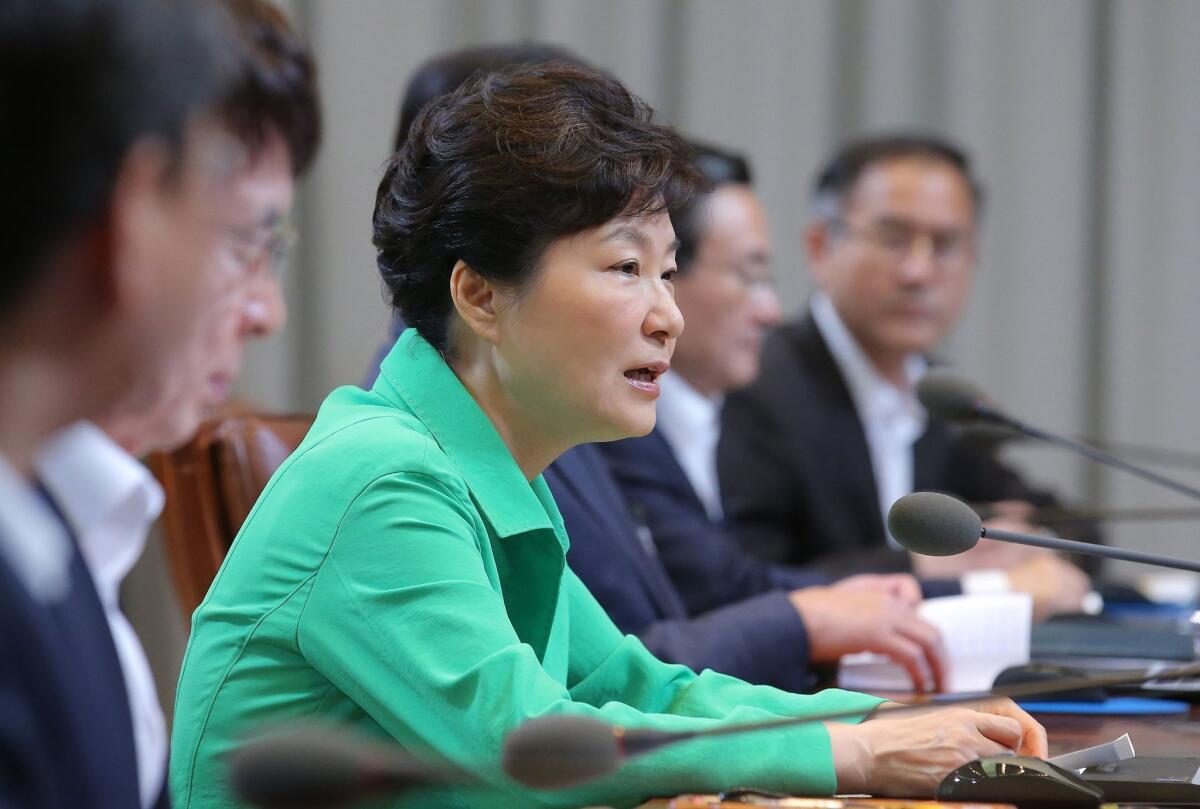North and South Korea reach deal to end ‘semi-state of war’

South Korean President Park Geun-hye speaks during a regular meeting of government officials at the presidential house in Seoul on Monday.
- Share via
Reporting from Seoul — North and South Korea reached an agreement early Tuesday intended to defuse a bout of cross-border tension that involved loudspeakers, land mines and artillery fire and that put their militaries on high alert.
Under the deal, South Korea pledged to stop broadcasting anti-North Korean propaganda from loudspeakers arrayed along the two countries’ heavily guarded border by noon Tuesday.
The North, in turn, promised to lift a “semi-state of war” that it announced Friday, and expressed “regret” over a land mine explosion that maimed two South Korean soldiers this month. Seoul had been pushing the North to apologize for planting the mine, but the agreement only expresses “regret” for the soldiers’ injuries and takes no responsibility for the explosion.
The Koreas also agreed to work toward holding a summit soon in Pyongyang or Seoul, and to discuss arranging reunions in September for families divided by the Korean War, which ended with an armistice in July 1953.
The terms of the agreement were announced by South Korea’s National Security Office Chief Kim Kwan-jin and carried by North Korea’s official Korean Central News Agency.
The crisis began early this month, when South Korea accused the North of planting three land mines that exploded along the two countries’ border, severing the legs of two South Korean soldiers. North Korea denied planting the mines; Seoul retaliated by activating the loudspeakers for the first time in 11 years.
On Thursday, North Korean troops shot at some of the speakers, leading to a brief artillery volley.
The marathon talks began Saturday evening and ran into the early morning. They reconvened Sunday afternoon and did not conclude until 12:55 a.m. Tuesday.
They involved high-level delegations from both sides. The South sent Kim, its national security chief, and Hong Yong-pyo, who heads the Ministry of Unification, Seoul’s body for relations with North Korea. The government in Pyongyang sent Hwang Pyong So, who is regarded as a top aide to leader Kim Jong Un, and Kim Yang Gon, the North’s top official for relations with South Korea.
As the meetings dragged on, both sides put their militaries on high alert. The South’s Defense Ministry said in a briefing Monday that South Korea and the U.S. considered deploying a B-52 bomber and nuclear-armed submarine to stand battle ready.
NEWSLETTER: Get the day’s top headlines from Times Editor Davan Maharaj >>
The South Korean military announced over the weekend that 50 North Korean submarines had left their ports. The North has also used amphibious landing craft to move special forces near the Koreas’ maritime border on the Yellow Sea, the South’s Yonhap New Agency reported Monday.
On Monday, the Rodong Sinmun, North Korea’s official newspaper, accused South Korea of creating the tension as a pretext for invading the North.
The loudspeakers have been a point of particular contention between the two sides. They blast information about life in South Korea 24 hours a day at several points along the border. Most North Koreans lack Internet service and can access only state-approved television and radio.
Experts say that the broadcasts threatened the North Korean government’s efforts to control what information reaches its citizens.
“North Korea is really nervous about the breaking of their information barrier,” said Stephan Haggard, a North Korea expert at UC San Diego. “They see the broadcasts as insults to their deified leader Kim Jong Un.”
When accused by the South, North Korea tends to not apologize for or admit to provocations. Relations between the two Koreas still have not recovered since 2010, when 46 South Korean sailors died in the sinking of the warship Cheonan. South Korea accused North Korea of torpedoing the ship; Pyongyang has steadfastly denied responsibility for the sinking.
Special correspondent Borowiec reported from Seoul and Times staff writer Kaiman from Beijing.
MORE ON THE TWO KOREAS
Rival Koreas restart talks, pulling back from the brink -- for now
Seeking to ease tensions, North and South Korean officials meet at the border
North Korea’s Kim Jong Un places nation’s border in ‘semi-state of war’
More to Read
Sign up for Essential California
The most important California stories and recommendations in your inbox every morning.
You may occasionally receive promotional content from the Los Angeles Times.










